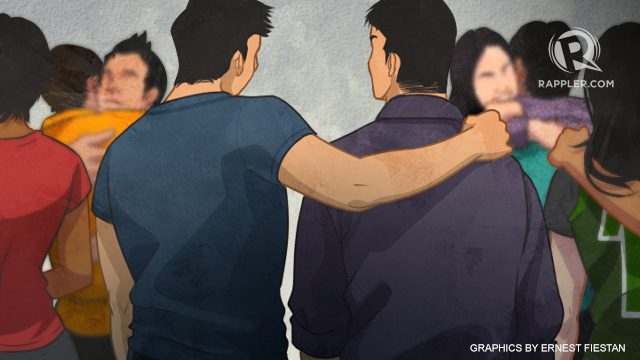SUMMARY
This is AI generated summarization, which may have errors. For context, always refer to the full article.

JAKARTA, Indonesia – With the recent rise of anti-LGBT sentiment – which has seen public figures make extraordinary claims like homosexuality being a result of consuming instant noodles – LGBT advocates wonder, is Indonesia becoming more conservative?
On LGBT Solidarity Day in Indonesia, on Tuesday, March 1, Hendri Yulius, a researcher on gender studies, expressed concern that Indonesia “is entering neoconservatism.”
He also said there is some evidence that radicalism is growing “among young generations particularly among universities.”
“If these groups are gaining more power, it’s not impossible we will adopt a more conservative identity as our national identity, and our national values,” he said. “This is for me very frightening and an issue that has to be immediately resolved if we don’t want to be an oppressive, authoritarian and anti-diversity country.”
Yulius said the anti-LGBT sentiment comes amid what he called a “trend,” that has also seen the government crack down on alcohol and prostitution. He said he noticed the rise in anti-LGBT sentiment after Republika, a conservative Islamic publication, posted a headline story on January 24, entitled: “LGBT poses serious threat to nation.”
The news article interviewed several conservative public figures, and sparked a “snowballing effect” which led to other government officials expressing their own opinions and views against LGBT.
Some of the statements in recent weeks included claims that homophobia is a mental illness, must be addressed like “modern warfare,” is contagious, or is an effect of eating instant food like noodles and milk.
The discrimination against LGBT however, goes beyond hate speech. LGBT in Indonesia find it almost impossible to access a national identity card, which prevents them from accessing basic needs like the rest of the community.
“The implications of not having ID cards is their difficulty accessing health cards, education and getting a decent job,” said Muhammad Nurkhoiron, special rapporteur of the National Human Rights Commission (Komnas HAM).
Same-sex marriage
He also said one reason why LGBTs are discriminated against is because the term LGBT in Indonesia is automatically associated with same-sex marriage – which most Indonesians are against.
“There are some people who can tolerate (LGBT) existence, but not tolerate same-sex marriage,” he said, pointing out that Indonesia does not provide a legal basis for same-sex marriage. “This is indeed a serious problem but should be addressed in a peaceful way and not reactionary.”
He added, “Disagreement on the legality of same-sex marriage is one thing, but conducting hate speech and discrimination because of disagreements is another thing that should become a concern of law enforcement officers.”
But Yulius clarified that LGBT in Indonesia are not even advocating for same-sex marriage.
“Since the beginning of the LGBT movement, we weren’t looking for same sex marriage,” he said. “In Indonesia, to end discriminatory practices, to provide access to education – that is more important than getting married.”
He said the Supreme Court decision in the United States has shifted the debate around same-sex marriages even in Indonesia, which is a myth, since the “movement here is not about legalizing same-sex marriage.”
Government’s role
The discrimination against LGBT, according to Nurkhoiron, includes the most of basic rights such as civil rights, the right to health, education, work, and housing among others.
“To this day, these rights have not been fully accepted because they still face discrimination. They have not only become a group of second-class citizens, in their own family they are discarded and isolated,” he said.
“Most families who have LGBT family members cannot accept this. They become the closest institution that conduct violence and exclusion.”
Nurkhoiron also expressed hope that President Joko “Jokowi” Widodo would speak out and take a stance supporting LGBT rights.
“The state should be present to remove all social prejudices and discrimination against LGBT persons. Ministries should cooperate and coordinate to succeed in Jokowi’s Nawacita (political) promise, and not engage to build hate speech,” he said.
Jokowi, in his political promise when he was running for the presidency, had expressed support for strengthening diversity and social restoration, and preventing discrimination.
But Yulius said that unfortunately, it appears Jokowi’s administration has been more discriminatory than the previous government of Susilo Bambang Yudhoyono.
He was however, unsure of whether Jokowi should voice his stance.
“His political power here is very fragile,” Yulius said. “If he talks, it will be used as a weapon of conservatives to attack the Jokowi administration… they will use this discourse against him.”
Yulius said Jokowi could instead ask someone to speak for him, but said he wasn’t entirely sure where Jokowi stands, and could very well share the opinions of his more conservative colleagues.
He agreed with Nurkhoiron, who said “people around [Jokowi] who come from the New Order” – like Vice President Jusuf Kalla and Coordinating Minster for Political, Legal and Security Afairs Luhut Panjaitan – have prevented progress and may influence Jokowi.
Yulius also expressed qualms about the increasing number of public figures jumping on the bandwagon and expressing their disapproval against LGBT, which he said is making it harder and harder for moderates to speak up.
“There has been shrinking spaces for moderate Muslims to speak in the public, university and media, while the spaces are being more occupied by conservatives,” he said.
When moderates speak, he said, they are accused of being “Western” or of “liberal secularism.”
“Using the discourse of human rights doesn’t work here, because people will accuse you of promoting Western, neoconservative agenda,” he said. “The discourse [to use] is access to public education, housing, and basic needs.” – Rappler.com
Add a comment
How does this make you feel?





There are no comments yet. Add your comment to start the conversation.